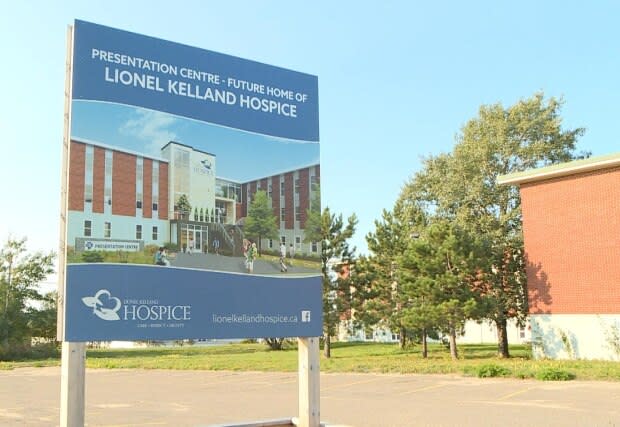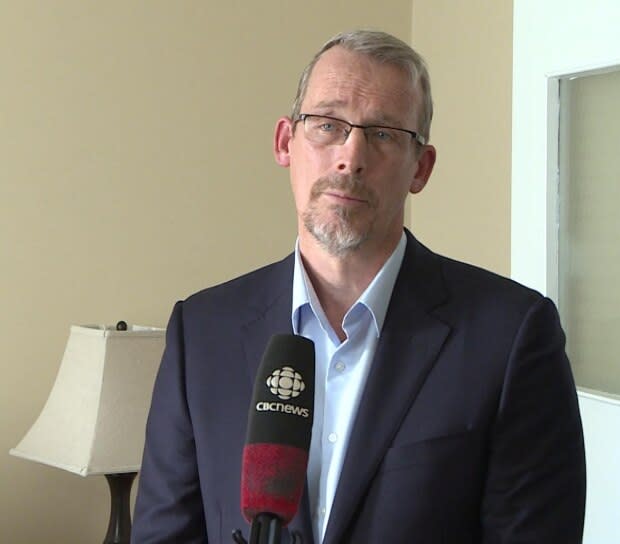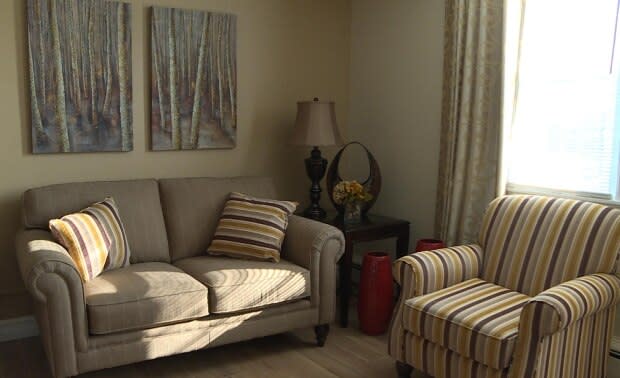With architects hired, N.L.'s first hospice is closer than ever

More than four years after they were gifted a building to call home, the finish line is finally in sight for a group proposing a hospice centre in Grand Falls-Windsor.
The board of directors of the proposed Lionel Kelland Hospice has hired an architecture firm and anticipates starting renovation work in early 2021, according to board chair Mark Griffin.
It's a major step for the group, which started meeting in 2014 to plan, raise money and advocate for the first hospice centre in Newfoundland and Labrador.
"We always knew what the finish line would look like; we didn't always know how far, whether it was a 100-yard dash or a marathon," said Griffin. "It's certainly been a marathon."
Fougere Menchenton Architecture has been hired to create a plan to convert their building — a former convent and residence used by the Presentation Sisters — into a 10-room hospice centre.
After construction begins, Griffin said, it should take another 10 to 12 months before the first families enter the Lionel Kelland Hospice.
"What this hospice is going to provide is patient-centred, family-centred, end-of-life care for people who are living with terminal illness," said Dr. John Campbell, an emergency room physician in Grand Falls-Windsor.
Campbell's been on the board of directors for the hospice project since the beginning.

"It will provide a home-like environment, with all the prerequisite professional and counselling supports for the last 30 days of someone's life," he said.
According to Statistics Canada, the majority of deaths in Newfoundland and Labrador happen in hospitals. But that number has been decreasing, as families look for options outside an institutional setting.
Newfoundland and Labrador's population is also rapidly aging: by 2030, more than a third of people in the Central Health area will be over the age of 65, according to government population projections. There will be more than 15,000 people over the age of 75.

Despite the best efforts of his colleagues, Campbell said, most hospitals just can't offer the right environment for a patient in palliative care.
"There's not a lot of accommodation made for longer stays, for more comfortable environments and for families and especially extended families to be visiting," he said. "It's very much about, come in, be treated and move to the next case. It's just not the set up that you need for the last 30 days of life."
The goal of the Lionel Kelland Hospice is to provide families in the province with a new option, one that combines services typically seen in hospitals with an environment that feels more like home.
"The death of a loved one is probably one of the greatest stressors that anybody endures in their entire life, and you only get one opportunity to do it right," Campbell said.
"It can actually be a reaffirmation of life, it can actually be about celebrating somebody's life, it can actually be about a meaningful conclusion to a rather substantial and unique journey. And that's all predicated on it actually being done properly, because it can also be an incredibly frightening, disorienting and terrifying experience for some people."
Campbell said the hospice will support families who directly avail of its services, but will also provide a sense of comfort and security for patients and families who choose to leave hospital and spend their final days at home, as they will know they have another option available.

The board's vision has won substantial public support: Since 2015, almost $1 million has come in via donations.
Last year, George Hart walked from Bishop's Falls to Grand Falls-Windsor, along with two of his friends, to raise money for the hospice project. He hopes to continue his efforts, even after construction has been completed.
"I became more aware of it after one of my friends who I played hockey with got cancer," he said. "He was only about 60 years old, and he died. I went up to the hospital and, I mean, he was in a room that if you put two or three people in there, it was crowded."

"There was carts around and everything else, and it just, you know, it wasn't the right way to die."
The board behind the Lionel Kelland project campaigned for years to get government support for their proposal. During the 2019 election, the Liberals pledged more than a million dollars yearly in operating grants for the hospice.
The provincial government also promised $3 million for construction and startup costs.
Griffin says the group's plan to hire an architect was delayed by the COVID-19 pandemic, but is now back on track.
He said with this stage of the project, the board of directors is now starting to see tangible proposals and changes to their building — finding out which rooms will be turned into nursing stations, and which will be turned into spiritual and rest rooms.
Griffin said his group is energized.
"It's been a long five years, but it's been a necessary five years.… Nobody ever said this was a bad idea; it just took some time to get to this stage."
Read more from CBC Newfoundland and Labrador


